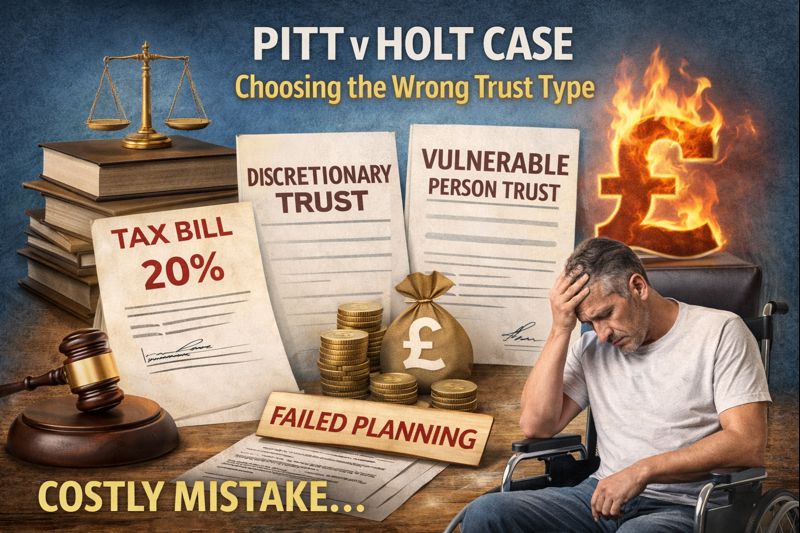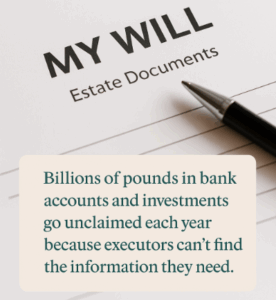Make Life Easier for Your Executors!
Your Will sets out what should happen to your estate after you pass away, but it’s only part of the story. Even the best-drafted Will can’t help if your executors don’t know where to find key information, accounts, and assets. When that happens, money can be lost, sometimes forever.
A 2022 estimate put the figure at around £1.2 billion in unclaimed bank assets. And that’s just what we know about.
Each year, billions of pounds in UK bank accounts go unclaimed after death because executors and families simply don’t know the accounts exist. Dormant accounts, lost investments, forgotten insurance policies – all slip through the cracks. A 2022 estimate put the figure at around £1.2 billion in unclaimed bank assets. And that’s just what we know about.
In one widely reported case, a man’s executors spent nearly two years trying to locate his savings, which were scattered across multiple banks and online platforms. Some accounts were only discovered after the estate had been distributed, forcing a costly legal process to reopen probate. In another instance, executors missed premium bonds worth tens of thousands of pounds because the deceased had never told anyone where they were held.
These examples underline a simple truth: clarity is kindness. Leaving your executors clear information can save them enormous time, expense, and stress — and ensure your estate goes exactly where you want it to.
1. The Essentials
Keep these with (or clearly referenced alongside) your will:
- Your Will and Codicils – The signed originals, plus details of where copies are stored. Don’t staple or pin anything to your Will.
- List of Executors and Trustees – Names, addresses, and contact details.
- Funeral Wishes – Even if stated in your Will, a separate, easy-to-find note helps executors act quickly.
- Certificate of Registration for Lasting Powers of Attorney (if relevant).
2. Financial and Property Information
Executors must locate every asset and liability in your name.
Provide a document listing:
- Bank and building society names (avoid account numbers for security).
- Property details – addresses, deeds, or Land Registry title numbers.
- Pensions and life insurance policies.
- Investments – shares, ISAs, bonds, or crypto wallets.
- Business ownerships, directorships, or partnerships.
- Debts and loans – credit cards, mortgages, or tax liabilities.
💡 Tip: Keep digital passwords separate but tell executors how to access them when the time comes.
3. Digital Assets and Online Accounts
Executors often struggle to manage online accounts. Make a digital inventory listing:
- Email and social media accounts.
- Cloud-stored data and digital photos.
- Subscriptions and memberships.
- Cryptocurrency and digital wallets.
Consider using a secure password manager or sealed envelope system, but keep it updated regularly.
4. Professional Contacts
Create a simple directory including:
- Solicitor or Will writer
- Accountant or financial adviser
- Funeral director (if pre-arranged)
- Bank manager or mortgage provider
- Insurance brokers
These contacts can often help executors locate documents or accounts they might otherwise miss.
5. Personal Notes and Legacy Wishes
Executors appreciate practical notes about your personal affairs, such as:
- Who to notify of your death (friends, colleagues, clubs, charities).
- Utility providers or household services.
- Charities or causes you’d like donations made to.
These are small details, but they make administration infinitely easier, and ensure your personal affairs are handled the way you’d wish.
6. How and Where to Store It
Store your Will and supporting documents:
- In a fireproof safe or secure cabinet.
- With your solicitor or Will writer.
- Registered on The National Will Register for traceability.
Make sure your executors know where to find it, not necessarily what it contains. Avoid storing your Will in a bank safety deposit box that can’t be accessed until after probate.
When Executors Can’t Find Everything
In some cases, assets eventually end up as unclaimed funds held by the Reclaim Fund Ltd, which manages dormant bank accounts, or on the government’s Bona Vacantia list if no heirs are located.
When information is missing, money and property often go astray. Estates can remain partly unadministered for years. In some cases, assets eventually end up as unclaimed funds held by the Reclaim Fund Ltd, which manages dormant bank accounts, or on the government’s Bona Vacantia list if no heirs are located.
If you’ve ever wondered whether someone you know might have an unclaimed estate, you can check here: Claim or refer an unclaimed estate – GOV.UK
Every name on that list represents a person whose estate was never fully connected with their family, often because no one knew what they owned, or where their documents were kept.
Final Thoughts
Your executors’ job is to carry out your wishes, but they can only do that if they have the information. A simple folder of organised documents could prevent your estate joining the billions that lie forgotten in bank accounts or government funds.














Post Comment